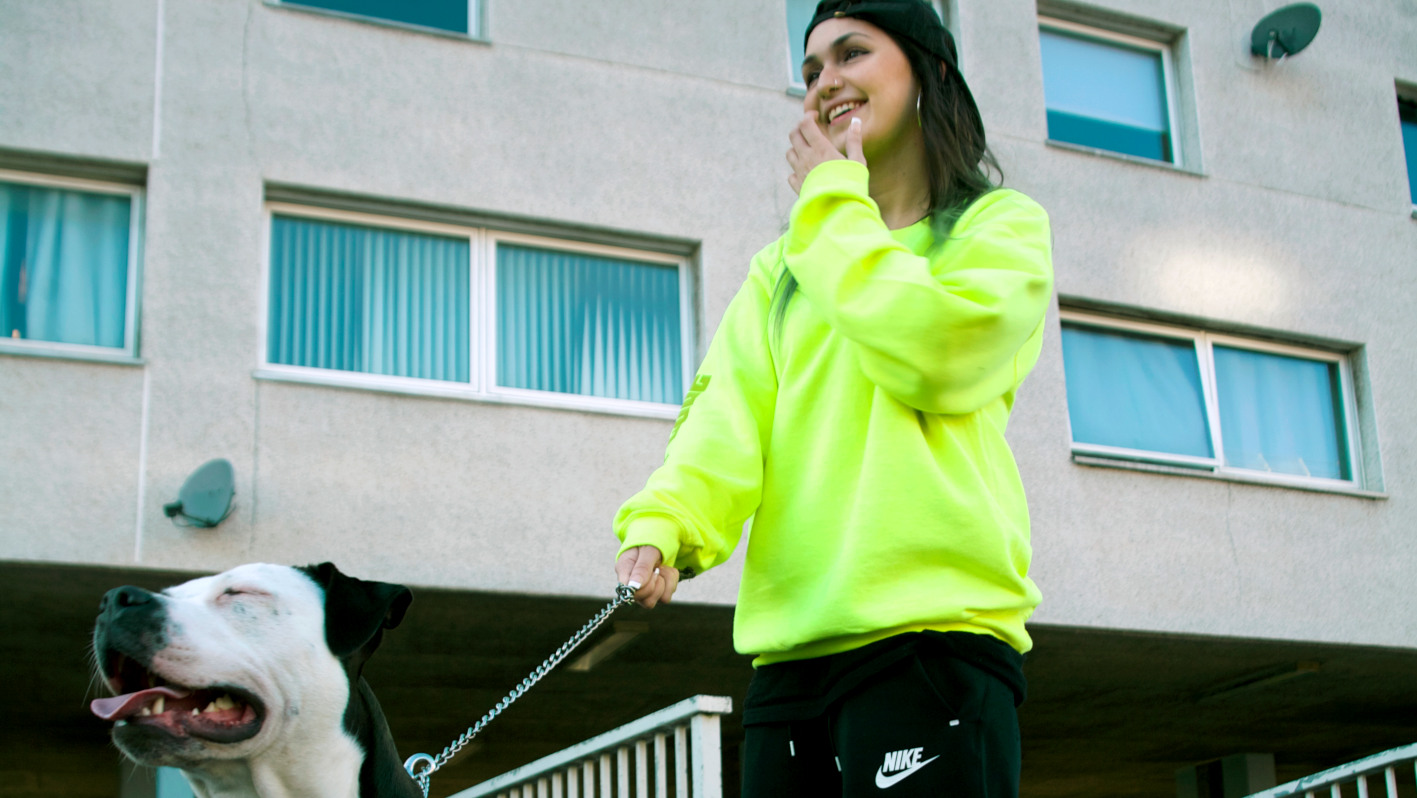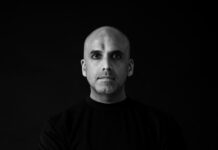Photo: Press (Barely Legal)
Can a DJ be both capable of adapting to every possible situation and be one of a kind? Barely Legal sure can. The Pretty Weird founder has established herself as a selector who can work with an afternoon crowd at an open-air festival as much as she will raise the roof of every undercloud with a set can go from grime to house in only a few tracks. It’s not really a compromise if you love all those genres equally. For her mix for the Groove podcast, Chloe Robinson draws on dubstep and future garage sounds for a set that, in her words, is “broken, bouncy, dark, wonky and floaty, with elements of dub” – one of a kind, surely, always adapting to its own flow.
You started collecting music early on and your mother’s passion for UK garage was an influence as well. How did it come about that you started DJing?
My good friend Silkie from Deep Medi strongly advised me to take up a hobby whilst I was at uni because I was either solo raving and collecting music, or doing my University studies and working at Harrods on the side. Despite being busy he said I needed to develop an identity and that it would actually compliment everything that I already do, so I listened to him – I was also your typical 20-year-old, lost, in a bad relationship and partying too much, so this hobby was hopefully going to fix things slightly for me in those areas. I spent my rent money on some Technics and began my new suggested hobby. I already had a real passion for music, a catalogue of records I’d discovered whilst out watching certain DJs and I did used to stand in the rave watching the DJ thinking “If they played *inserts track* now they’d definitely redeem the dance floor,” so naturally I had the mentality.
Grime is also a cornerstone of your sound ever since you came in touch with it at the beginning of the last decade. How did you as a fan perceive developments within the genre from Skepta or Stormzy getting international recognition to the genre being discussed more broadly in a political context during #Grime4Corbyn?
I thought the Grime revival was amazing and very exciting, especially having followed the journey of the artists from the start. I actually cried a little during Stormzy’s performance at Glastonbury – hearing 100,000 people singing the instrumental Ruff Sqwad – “Functions” on the Low was unreal. Such a moment. Four Tet tweeted something similar, he felt it too, it was an unforgettable, surreal experience. Stormzy is a great role model for the younger generation and he wasn’t shy to talk politics either during the set. I’m not going to lie, I don’t really know much about politics, but I definitely experienced the influential impact the Grime scene set.
After relocating from your native Birmingham to London, the FWD>> and DMZ nights became formative for you. What drew you to those parties in particular, and the then burgeoning dubstep scene in general?
I moved to London as a Grime fanatic so I would hunt down the raves which catered to that. I used to go raving on my own which I loved, I’d research what MCs and DJs were at specific events and then buy tickets and experience the London parties which were about the sound I was into. Along this journey of attending different raves there was one specific night which became a regular for me – FWD>> at Plastic People. It was only 100 cap so I’d always be half an hour, early first in line, and the line ups were incredible, as was the space. A dark room where you couldn’t see the DJ, a banging sound system, it was perfect. It changed my life and I discovered other genres which I wasn’t familiar with in Birmingham through the selection played by certain acts there – dubstep being a main one. Once I discovered the Croydon dubstep sound I was obsessed. I attended the annual DMZ nights which were unforgettable, there was such a sense of culture and community at these parties, people were there because they genuinely loved the music and you always saw the same faces. I even flew out to Outlook Festival on my own in 2010 because the line up was unreal and that festival experience definitely played a crucial part in my journey. All this was prior to me being told to buy decks by the way, the idea of being a DJ hadn’t even crossed my mind at this point. I was just a raver full of excitement and passion.
You are what you yourself call a “pure DJ,” meaning that you do not produce music. Have you never considered trying your hand at making music?
This is something I get asked regularly and it has only been recently that I am actually pretty keen to the idea of making music. I kinda know what I reckon I’d make, I just need to get my head around Ableton on a more professional level and perhaps ask for some help and guidance from my friends who produce.
Your sets can draw on house, UK garage, grime, drum’n’bass and many other different genres, and you usually play a lot of promos. How do you prepare for your sets? Do you have certain system of ordering your music?
I try to create something unique for each set I do. Where I’m versatile in my selection, I play on a lot of very different line ups so I’ll cater them to what will make sense, taking into consideration the other acts I’ll be playing with and the type of crowd I’ll be playing to.
You’ve also said that especially playing as the support DJ for other artists on big stages can be specifically challenging. Do you follow a certain strategy when dealing with a crowd that maybe has come to see another DJ play?
I’m still figuring out the perfect strategy for this. It’s definitely challenging. I think what I tell myself now is to do just do me, but keep the sets very fun and engaging. They aren’t necessarily there to see you play so it’s best just ensuring you’re playing tunes they are enjoying- in an ideal world I’d love to just play sets of unreleased music as that’s what I’d want to hear as a raver but I think it’s different now so it’s all about balance. Play some new bits but tease them in amongst tunes which everyone is familiar with and will go off. Use it as an opportunity to make yourself known to a new audience, if they liked your support set you’ve potentially gained a new fan base.
In 2017, you have started the label and event series Pretty Weird. What’s most important to you when curating the releases and programming the line-ups for your parties?
I often get told I’m doing things wrong by being a multi-genre DJ, that I’m making myself confusing as an act. Whilst I appreciate opinions I believe in who I am and what I do. As a raver back in the day the holy trinity – Ben UFO, Jackmaster and Oneman were my favourites. I wanted to be kept on my toes and hear curveballs in sets and I put that into practice when I started mixing. As a result, the Pretty Weird parties aren’t a specific sound, I’ve created a range of parties to cover all the areas of music I love. I wanted it to be even more diverse but promoters need to see the vision before they trust it so I can hopefully achieve full goals in 2020. For now, I am very happy with the line ups I’ve curated. I have a mix of old generation and new which was special to bring together. I’m also really happy with the gender balance, it’s good to see such a strong collective of female talent amongst the line up, I believe the key to tackling diversity is for the girls to work together, not against each other, which unfortunately you can often find in this industry. With respect to releases, my selection is broad, so this is reflected on the label. If the tune is sick and it’s something I can see myself playing in my sets, I’ll put it out, simple. No rules.
What was the idea behind your contribution to the Groove podcast?
Initially I wanted to create a mix which flowed mad smooth. I have a tendency to mix things up differently genre-wise to keep things interesting which can result in a fun mix, however sometimes I’ll bring in curve balls quite abruptly. I wanted to actually respect the journey of this mix and try keep a rolling flow whilst still being diverse in the selection, genre wise. I was quite specific about the track list, you’ll hear tunes which have definitely taken inspiration from the dubstep and future garage era, but most of the tracks are new. I’d describe the sounds of the mix as broken, bouncy, dark, wonky and floaty, with elements of dub.
Stream: Barely Legal – Groove Podcast 225
01. Nikki Nair – David
02. Low Dimension
03. Four Tet – Lahaina Noon
04. Al Wootton – Bad Sound
05. Graver
06. Mickey Pearce – ???
07. Addison Groove – Catch
08. Nina Kraviz – Show Me Your Time
09. Walton – Rolla
10. Nikki Nair – Animals
11. Pressa – ADHD
12. Jubley – Conduit
13. Reptant – Knife Spoon
14. Konrad Wehrmeister – Kitchenknife
15. Martyn – Frozen Bread Snaps
16. Al Wootton – Prophecy
17. Addison Groove – It’s Got Me
18. James Blake – Air & Lack Therof
19. Alix Perez – Melodrama
20. Pearson Sound – Blanked
Pretty Weird Tour
29th September: Sneaky Petes, Edinburgh – Lineup: Proc Fiskal, Barely Legal
04th October: Lunchmeat Festival, Prague – Lineup: Jensen Interceptor, TSVI, Barely Legal
18th October: Gretchen, Berlin – Lineup: 6 Figure Gang (Sherelle, LUCY, Fauzia, Jossy Mitsu, Yazzus, Dobby), Barely Legal
19th October: Leoncavallo, Milan – Lineup: Addison Groove, Barely Legal
25th October: Moles, Bath – Lineup: DJ Storm, Barely Legal
22nd November: Butlins, Skegness – Lineup: High Contrast, DJ Hype, Fabio & Grooverider, Kyrist, Just Geo, Barely Legal
7th December: Wigwam, Dublin – Lineup: Batu, Barely Legal





